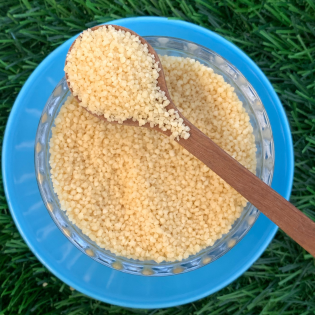COUS COUS

Couscous is neither a grain nor a seed; it’s a form of pasta made from a dry mixture of semolina and water that’s rolled in very tiny irregular pieces. Like rice, couscous is a blank canvas that can take on any flavors you want to add. Mixing it up and creating something new is what being inspired by cooking and ingredients is all about. All couscous is made from semolina. Semolina is the name we give to flour that is ground from durum wheat. Rich in selenium, couscous can help boost your immune system and reduce your risk of some diseases like cancer.
Nutritional Content Of Cous Cous (100g)
- Calories – 112kcal
- Fats – 0.2g
- Carbohydrates – 23g
- Protein – 3.8g
- Fiber – 1.4g
Good Source Of Fiber
- Couscous is a source of fibre, but to optimise levels, it’s worth looking for wholemeal couscous, which is made from the whole grain. Fibre supports digestive health and alleviates constipation, and research suggests it may help improve levels of beneficial bacteria in the gut. Wholemeal couscous is also more filling, as the fibre slows down the breakdown of sugar into the bloodstream, providing a more stable source of energy.
Healthier Alternative For Rice
- Couscous provides more protein and a greater contribution of vitamins and minerals than the equivalent portion of white rice. Cous cous is quick to make and melds well with vegetables and lean protein, which makes it an excellent ingredient to transition to a healthier lifestyle.
Good Source Of Plant Based Protein
- Although not a complete protein, couscous is a good source, providing approximately 7g per 100g (cooked weight). It’s a useful Inclusion in a plant-focused diet, a way of eating that may be linked to lower risks of conditions like stroke, heart disease and cancer. Couscous is a simple way to work more protein into your diet. Though it&`s not a complete source of protein but, When paired with other protein-rich foods like legumes, poultry and nuts, a plate of couscous makes for a protein-packed meal that will help you better achieve your health goals.
Vegan
- Being that it’s made from wheat and water, cous cous is a plant based food that vegans and vegetarians can enjoy. Cous cous can help you create a vegan-friendly meal full of nutrients like the ones mentioned above. And because it can be combined with just about anything, you can easily customize any cous cous recipe to your taste preferences.
Rich In Selenium
- Selenium is an essential mineral with many health benefits. It’s a powerful antioxidant that helps your body repair damaged cells and decreases inflammation. It also plays a role in thyroid health. It’s essential for proper thyroid gland function, protecting it against damage and contributing to hormone production. The selenium in couscous may help lower your risk of heart disease by reducing inflammation and oxidative stress in your body. Its antioxidant function can also help reduce the buildup of plaque and “bad” LDL cholesterol on artery veins and walls.
- Couscous is simple to prepare and takes on the taste of other ingredients, making it an easy addition to meals. Properly cooked, couscous is light and fluffy. What’s more, it tends to take on the flavor of other ingredients, making it very versatile. Couscous can be added to salads or served as a side dish with vegetables. It can also be combined with another grain such as quinoa, brown rice as well as vegetables, to add more nutrients and amino acids to your diet.


